Quality
GenesisCare is committed to providing high quality care for all patients. The GenesisCare vision and values provide a framework for ongoing review and evaluation that enables us to strive for continuous improvement in how we deliver care to our patients.
Our quality program is built on four priority areas that are centred around meeting patient needs and supporting our goal of high quality care, and aligned to the National Model for Clinical Governance. Our four priority areas are:
- Safe - Ensures our safety and quality systems are set up to actively manage and improve care for our patients.
- Well Led - Provides the governance and leadership for safety and quality, and drives continuous quality improvement.
- Caring and Responsive - Promotes a culture that engages patients, carers and our clinical teams in delivering high quality and safe care based on patient needs.
- Effective - Monitors performance to ensure that care is delivered in a high quality, safe and efficient way by skilled and knowledgeable clinical teams.
To support progress against these quality priority areas, we collect data in accordance with GenesisCare’s Privacy Policy to measure how effective we are in delivering high quality care. We then use this data to work in partnership with our patients and staff to reflect an organisation wide commitment to:
- Continuous review and improvement of our patient safety and quality systems
- Educating our patient services and health care provider teams of the importance of monitoring and reporting the safety and quality of the services they provide
- Ensuring accountability for the safety and quality of care at all levels of our organisation
A key element is to meet and exceed the requirements of mandatory accreditation. The National Safety and Quality Health Service Standards (the Standards) were developed by the Australian Commission for Safety and Quality in consultation and collaboration with the Federal and State governments, technical experts and a wide range of stakeholders, including health professionals and patients.
The Standards provide a quality assurance mechanism to ensure an acceptable level of safety and quality is met. We also use the Standards to help us set goals for the future of GenesisCare.

Know your rights as a patient
As a patient, you are at the centre of our approach to providing high-quality, safe and effective care. We aim to look after you and keep you safe during your treatment, engage you in decisions about your care, and ensure we are aligned in establishing agreed goals of care. This includes discussion of care plans with you, and seeking feedback from you and your carers, where appropriate, on where we can improve. You can find more information about how we work with patients on our Working with Patients page.
The following resources are available for patients:
Our partnership with you
This resources outlines how GenesisCare works with patients, carers and support people and the processes that are in place at to ensure patients are actively involved in decisions about thier own care.
Australian Charter of Healthcare Rights
This is a Australian Government resource that describes the rights the rights that patients can expect when receiving health care in Australia. The charter is available in a number of formats adapted for people from diverse backgrounds including:
- Australian Charter of Healthcare Rights (English)
- Australian Charter of Healthcare Rights (Languages other than English)
- Australian Charter of Healthcare Rights (Aboriginal and Torres Strait Islander)
- Australian Charter of Healthcare Rights (LGBTIQA+)
National GenesisCare safety and quality monitoring
We collect and report clinical information in order to monitor the safety and efficacy of the care we provide. The quality and safety data is measured as the number of incidents per 1000 occasions of service. An occasion of service refers to any treatment or other service provided to out-patients in a health service facility.
We are extremely proud to share our quarterly safety and quality results relating to six key safety areas in healthcare. A comparison of how well we are achieving our achieving our goals is provided against the national benchmark where this is available.
Keeping you safe
Our rate
0.10
(Lower is better)
Patient falls per 1,000 occasions of service
National Average*
2.0
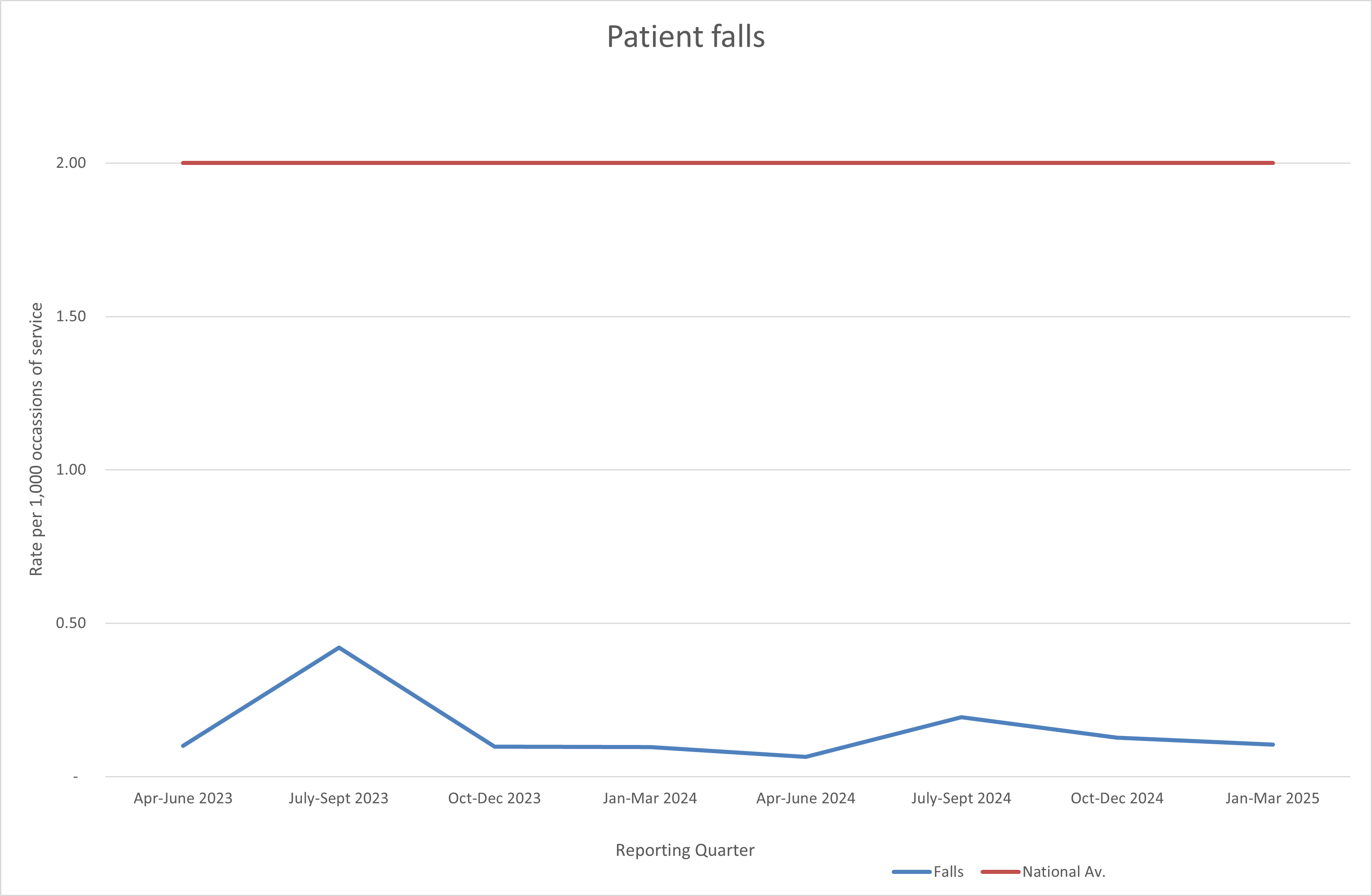
*AIHW 2021-22 Private hospitals admitted patient data for falls resulting in patient harm
Falls prevention is our primary goal as falls are one of the largest risks when it comes to medical complications. GenesisCare has several processes in place to help reduce the risk of a patient having a fall. We continue to ensure we have education, reporting and action plans in place to ensure these processes are effective.
Things you can do: You can help reduce your risk of a fall by wearing well-fitting non-slip shoes, bringing your walking or mobility aids with you when you come into one of our centres, and letting staff know if you have had recent falls or feel unsteady on your feet.
Our rate
0.06
(Lower is better)
Medication related incidents per 1,000 occasions of service
National Average*
1.0
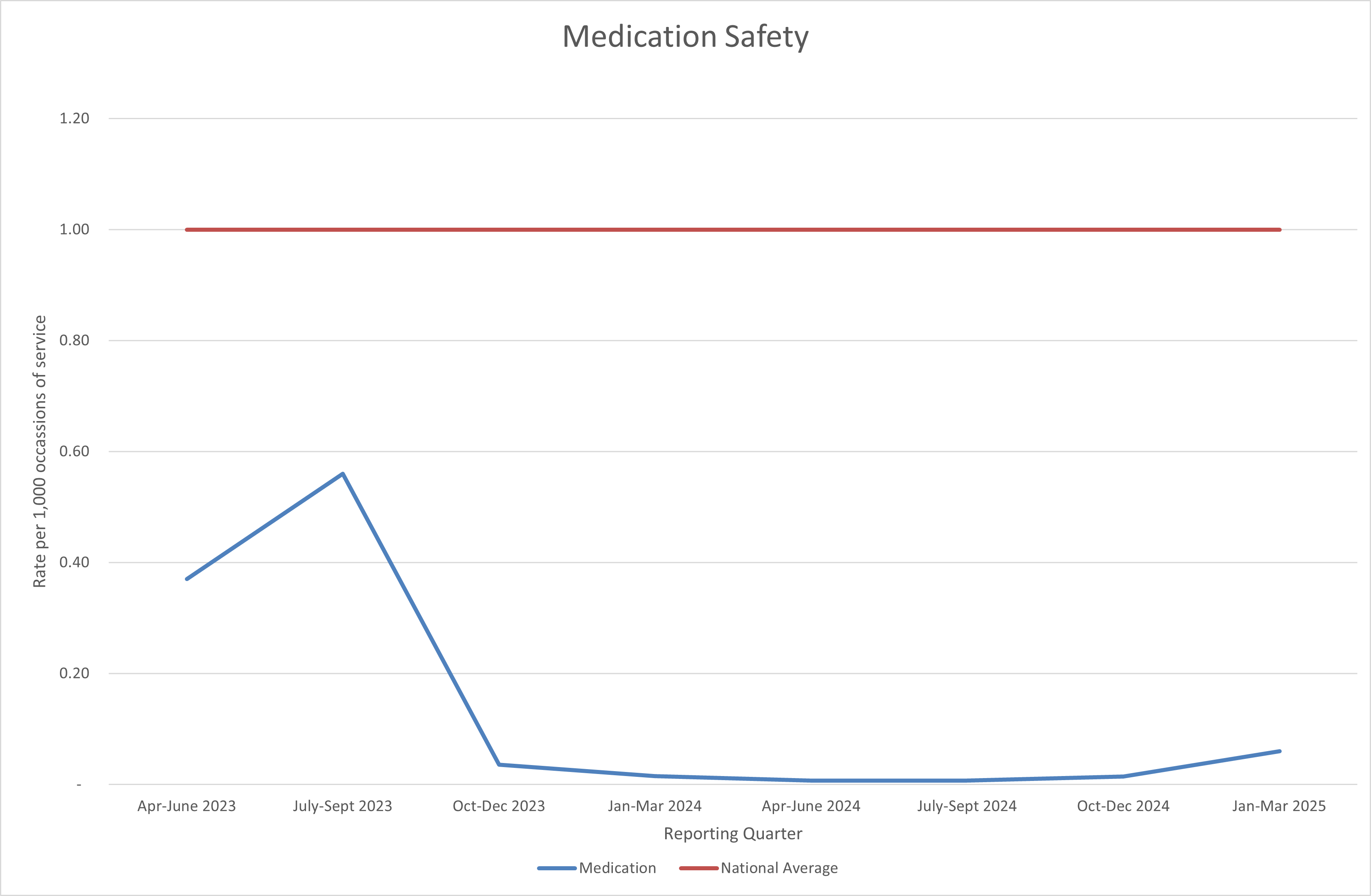
*AIHW 2021-22 Private hospitals admitted patient data for medication related complications
GenesisCare takes all medication errors very seriously. All incidents are investigated to improve medication management and reduce the risk of future errors. GenesisCare uses a specialised medical oncology and radiation oncology health information system to manage and document medication and treatment for our patients, which helps to reduce the risk of errors occurring.
Things you can do: You can help by being involved in the management of your medications and having a list of the medications you are taking. Let the treating nurses and radiation therapists know of any medications you are taking, any allergies, or if your doctor has changed any of your medications since your last visit.
Our rate
0.35
Patients experience a clinical deterioration during their care per 1,000 occasions of service
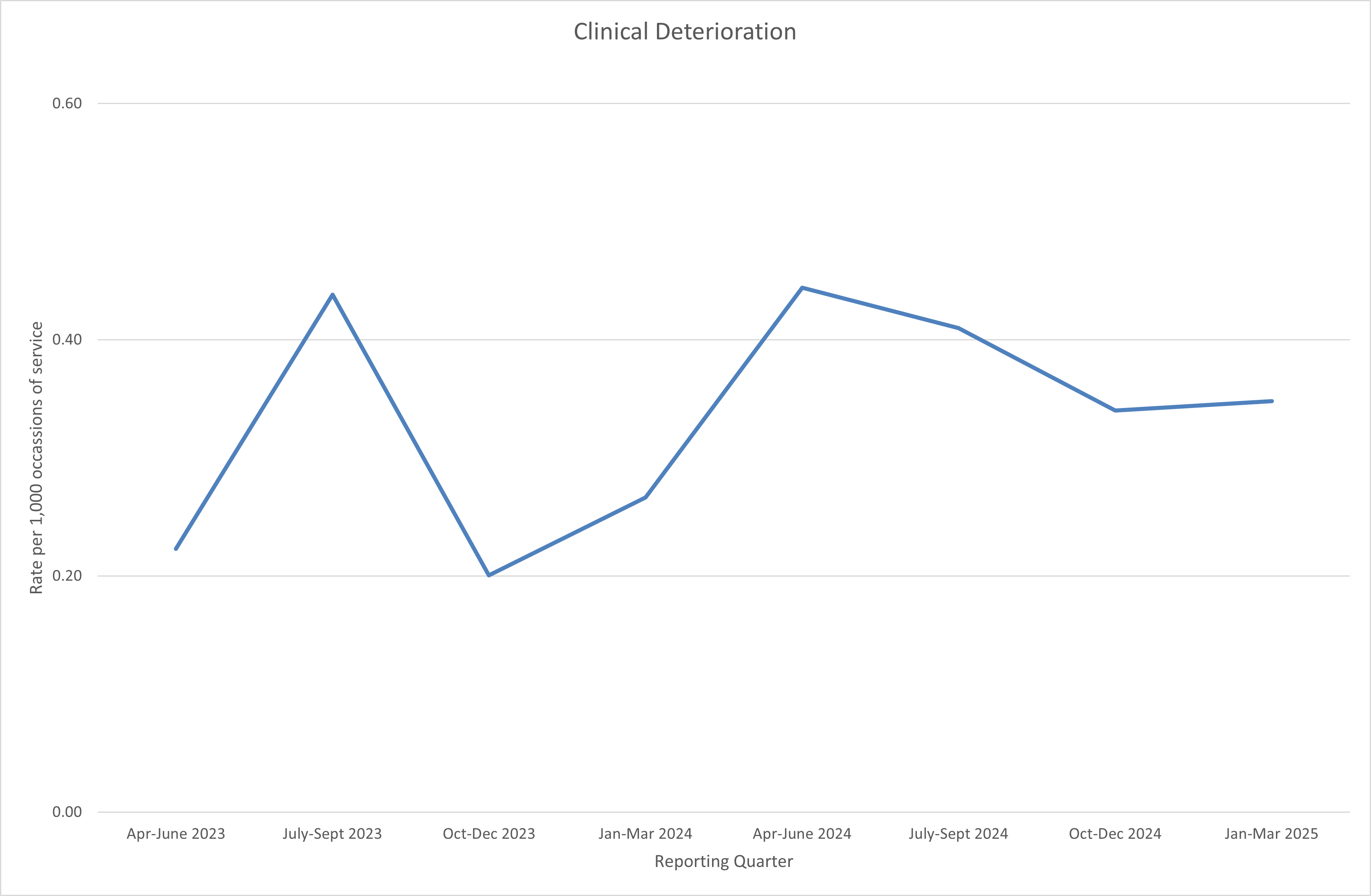
Recognising that a patient’s condition is deteriorating and responding to their needs in an appropriate and timely way is essential to keeping our patients safe. We have systems to help us recognise when a patient becomes unwell to make sure we respond quickly to prevent further deterioration. We also record and review any incidents where we have transferred a patient to a hospital because they have become unwell, so that we can incorporate any learnings into future care.
Things you can do: You can help by alerting your treating team if you are feeling unwell or notice changes in your condition. This includes worsening of symptoms, or the development of new symptom, as these may be important for your healthcare team to be aware of. Alerting the nurses, doctors or radiation therapists early allows them to assess you and make any necessary adjustments to ensure you remain safe.
Our rate
0.14
Patient Identification incidents per 1,000 occasions of service
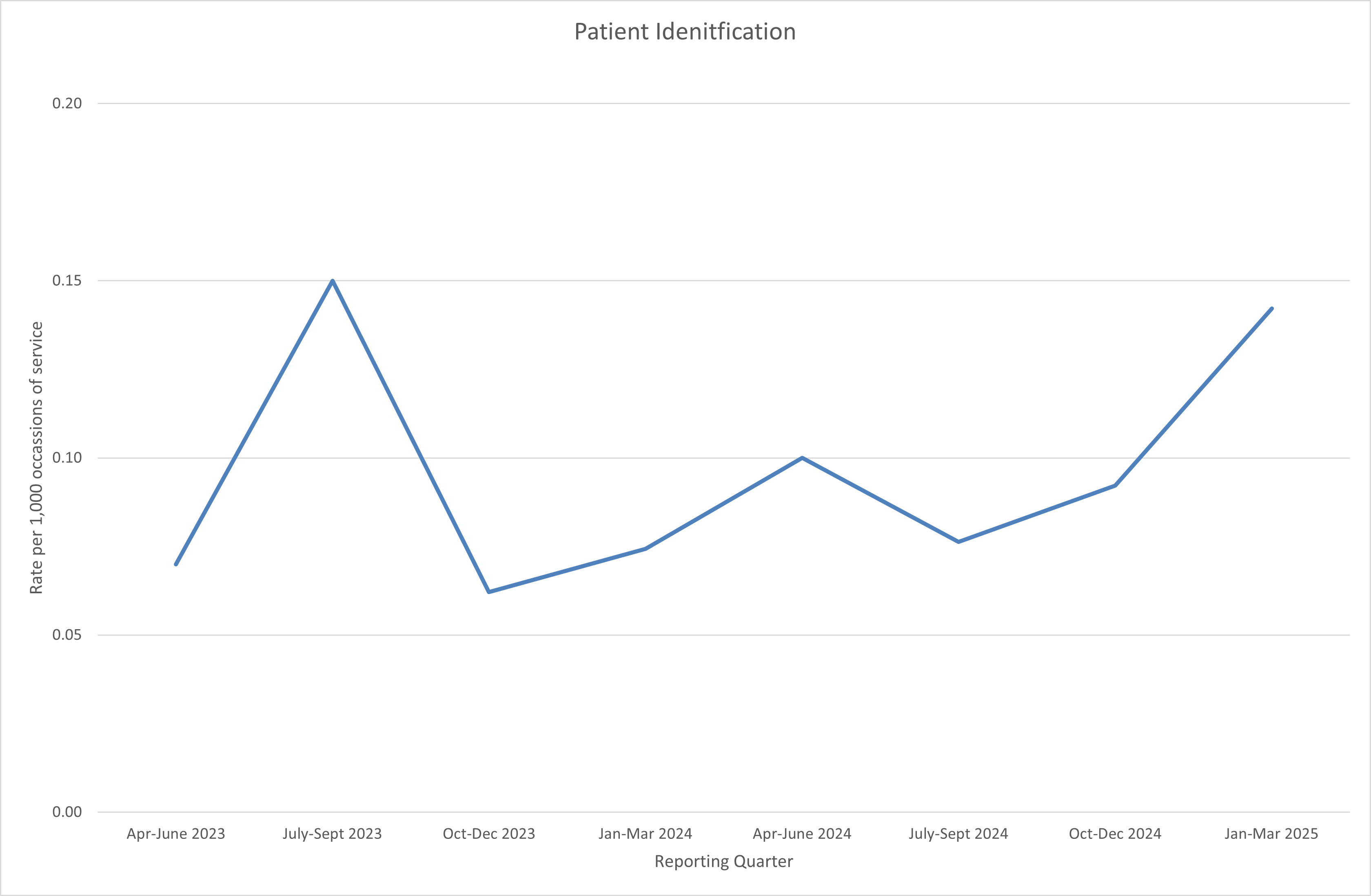
Ensuring the right treatment is provided to the right patient every time is important in keeping our patients safe. This is why our staff will ask you to identify yourself through each stage and interaction of your care. Each time they ask, they will look for three points of identification. These safety steps help to ensure that care and treatment for one patient is not mixed with the care intended for another patient.
Things you can do: You can help by answering the identifier questions when asked, making sure the identifiers used are accurate and match your details, and letting staff members know if they have not correctly identified you before they start any treatment or procedure.
Our rate
0.03
(Lower is better)
Healthcare associated infections per 1,000 occasions of service
National Benchmark**
1.0
Our rate
95%
(Higher is better)
Hand hygiene compliance
National Benchmark*
85%
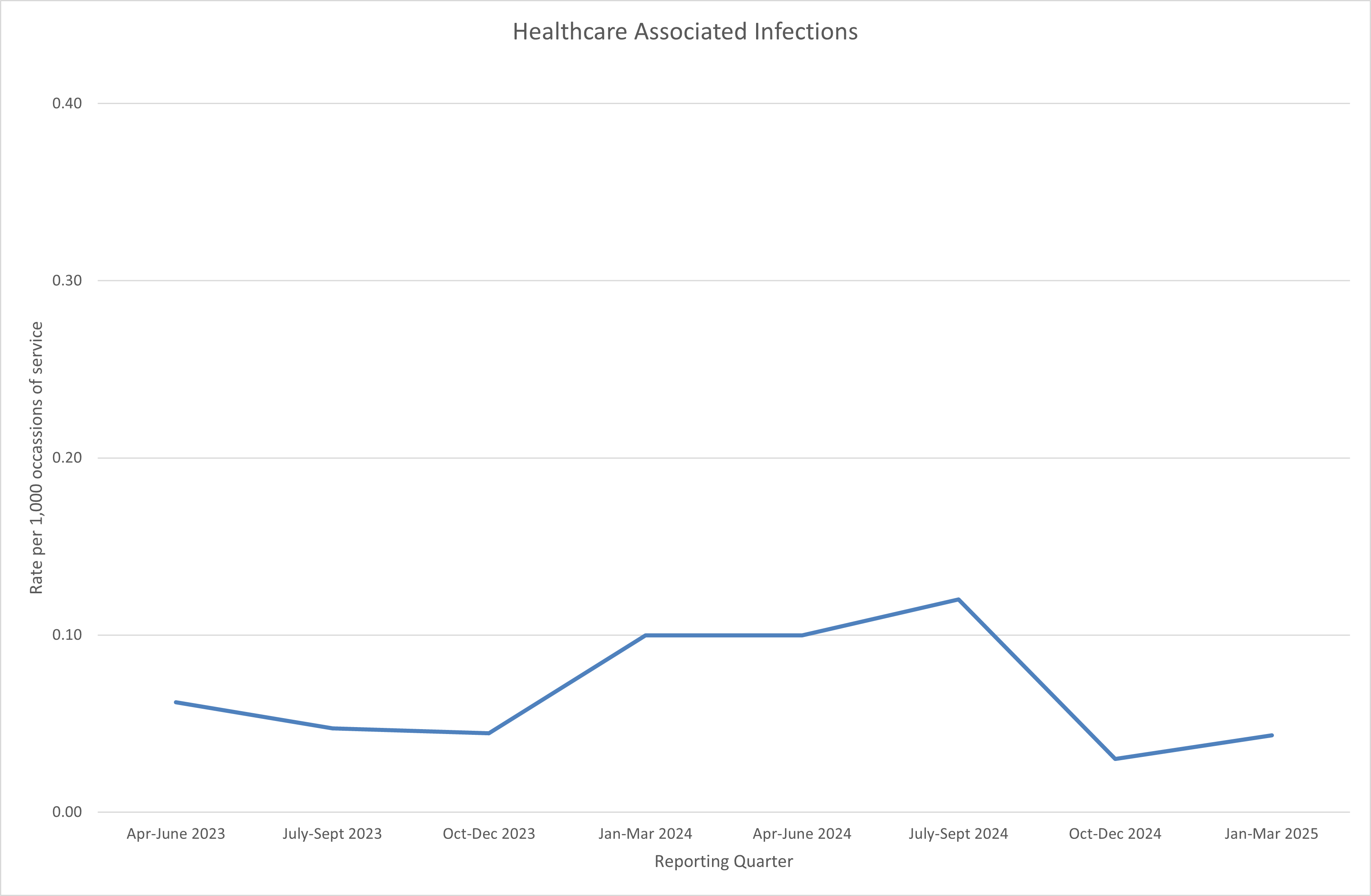
**National benchmark is for Staphylococcus Aureus Bloodstream Infections (SABSI). The GenesisCare rate accounts for all infections including SABSI.
#The National benchmark is set by the Australian Commission for Quality and Safety in HealthCare
One of the most effective means to prevent infection spreading is for all health professionals and anyone entering our premises to engage in good hand hygiene practice. Our hand hygiene program is aligned with the National Hand Hygiene Initiative (NHHI) and monitors compliance with hand hygiene during patient interactions in all our sites.
Things you can do: You can help by ensuring that you wash your hands or use the alcohol hand rub when you enter and leave the facility, as well as after any interventions. Let the staff know before you arrive if you have cold and flu symptoms, and ensure any family, carer or support person does not come with you if they are suffering from cold or flu symptoms.
Our rate
0.03
(Lower is better)
Pressure injuries and skin integrity incidents per 1,000 occasions of service
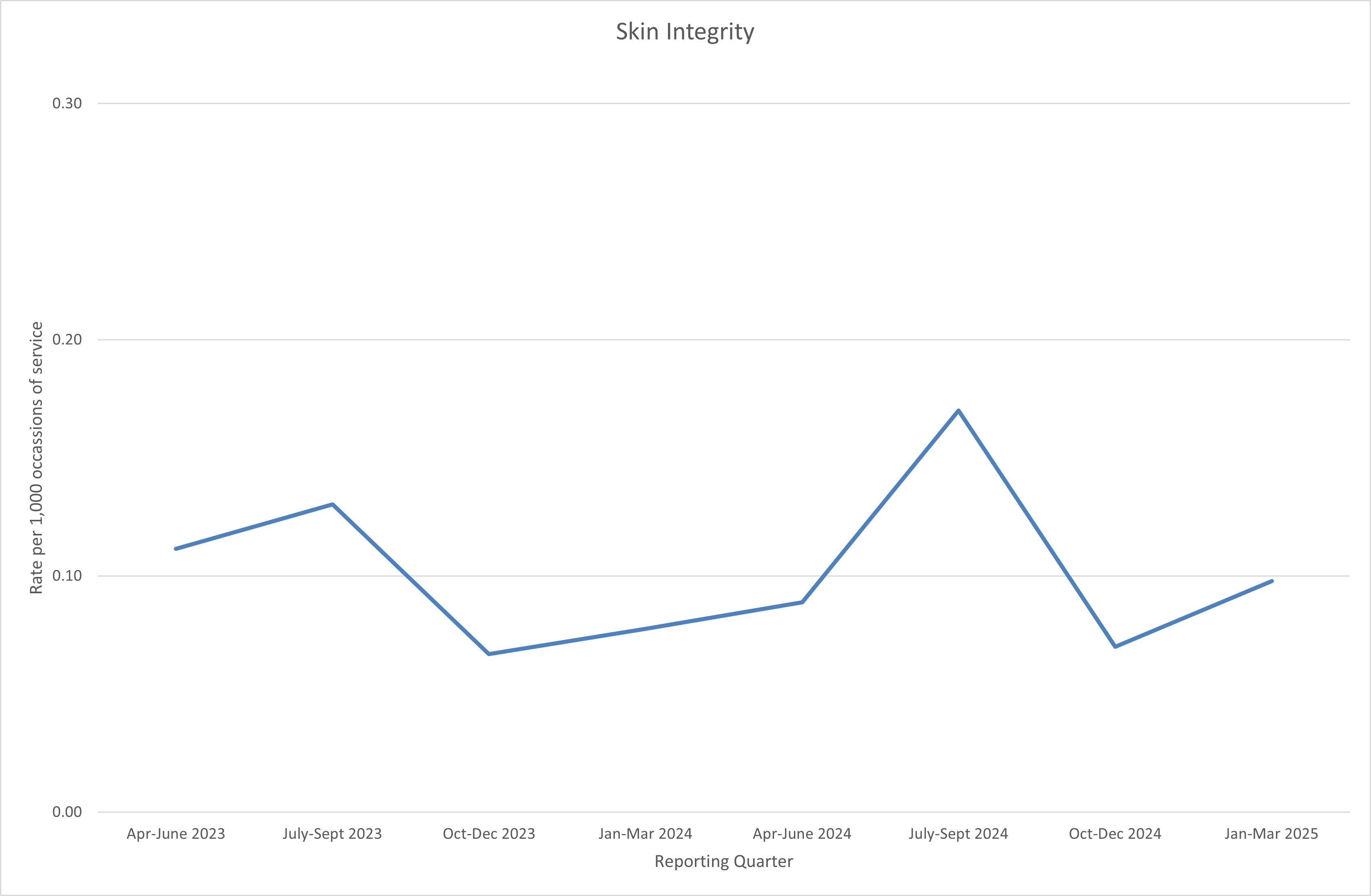
In addition to pressure injuries, we also monitor and report on other causes of skin breakdown, such as injury to the skin following radiation therapy. Staff providing care will continually monitor a patient’s skin to assist in maintaining healthy skin during treatment.
Things you can do: You can help by following the skin care instructions provided by your treating team, and notifying the nurses, doctors or radiation therapist if your skin is becoming red or irritated.
Our rate
0.49
Clinical handover errors or omissions per 1,000 occasions of service

Clinical handover refers to the transfer of responsibility and accountability for some or all aspects of your care from one healthcare professional to another on a temporary or permanent basis. This includes communication from referring hospitals, between doctors and staff, and between GenesisCare staff. GenesisCare use tools to facilitate comprehensive clinical handover between teams. Staff will update patients and include them in clinical handover so they have the opportunity to add any additional information.
Things you can do: You can help by being involved and informed during the clinical handover process. We encourage patients to take responsibility by asking questions and staying up to date in relation to their condition, treatment, and medical records.

You are leaving our website
You are now leaving our website. GenesisCare do not control this content and therefore are not responsible for its accuracy or reliability.

You are leaving our website
You are now leaving our website. GenesisCare do not control this content and therefore are not responsible for its accuracy or reliability.
